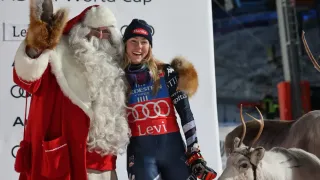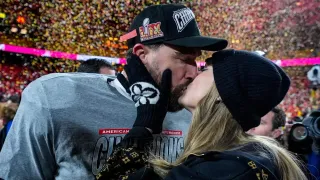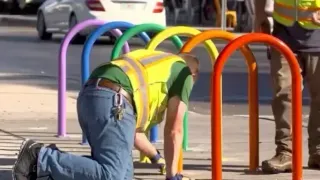August 9, 2024
Review: Horror Film 'Cuckoo' Intrigues with Dread and a Great Performance by Hunter Schafer
Megan Kearns READ TIME: 4 MIN.
Being a teenager is hard enough as it is, but its difficulty becomes amplified moving to a new place. "Cuckoo" takes this premise to foreboding, dizzying heights.
An eerie, tense horror film, "Cuckoo" evokes a viscerally creepy atmosphere with harrowing moments of dread and disorientation. Starring Hunter Schafer, the film is written and directed by Tilman Singer (writer/director of horror film "Luz").
Set in Germany in the Bavarian Alps, the film follows 17-year-old Gretchen (Schafer). After the recent death of her mother, Gretchen moves from the U.S. to a new home with her father, Luis (Martin Csokas), stepmother, Beth (Jessica Henwick), and her mute half-sister, Alma (Mila Lieu). Herr Konig (Dan Stevens) owns the new home they move into as well as the town resort.
Grieving, Gretchen frequently calls her mom's voicemail to hear her voice and talk to her. Gretchen reveals her apprehension that it was a mistake moving to this place with her father. She refuses to call Alma her sister, and seems estranged from her father. He tries to provide reassurance that the family is excited she's there, but tensions grow when Alma begins having seizures.
Clues abound that everything is not all that it seems to be. Strange occurrences happen. The family dog growls (never a good sign in a horror movie!) when the family arrives at their new home, as we hear lots of screeching birds in the nearby woods. At the resort, a disoriented woman chugs a drink in the store and leaves without paying. Various women vomit in public. Time keeps inexplicably looping and repeating.
A mysterious, ghoulish-looking hooded woman (with red glowing eyes visible through sunglasses) follows Gretchen. Henry (Jan Bluthardt), a detective, questions Gretchen as he's investigating the hooded woman, believing she's tied to murders.
Hunter Schafer captivates as Gretchen, the only person in the film shrewd or bold enough to question what's going on. She exudes ease and authenticity in her acting. Even when loudly expressive, her acting feels grounded. She's excellent as Jules in the series "Euphoria," her first acting role. "Cuckoo" was her first time on a film set, and her first leading film role.
Gretchen shows she's smart and resourceful, thinking quickly on her feet. Trapped in a room, Gretchen lifts a bed's mattress and breaks the bed's wooden slats to use as weapons. In another scene, hiding from someone following her, she uses a copier machine as a distraction.
Dan Stevens always chooses intriguing roles. He's incredibly compelling, and makes interesting choices in his acting in a variety of genres. I've particularly enjoyed him in the period drama series "Downton Abbey," poignant sci-fi romance "I'm Your Man," and fun horror film "Abigail." I'm always excited when he appears in a film or series.
Stevens is effectively creepy here. The camera follows his hand as he touches Gretchen's shoulders creepily when introducing her to a doctor in town. Konig repeatedly inserts himself into Gretchen's family, whether advising Luis, offering Gretchen a job at the resort, or being weirdly fixated on Alma.
Filmed on 35mm, "Cuckoo" boasts striking visuals. Extreme close-ups of vibrating throats and ears twitching; the screen itself vibrating in correspondence with strange birdlike sounds. Frequent dissolves lend the visuals a dreamlike, surreal element.
Evocative of German Expressionism often used in film noir and horror, "Cuckoo" brilliantly utilizes vivid shadows as ominous harbingers, conjuring resonances with F.W. Murnau's "Nosferatu." "Cuckoo" opens with sounds of fighting between a woman and a man, their violent shadows visible on the wall adjacent to stairs. In another memorable scene, Gretchen bikes at night, catching a glimpse of her shadow on the ground – and she sees the shadow of a person running after her with an outstretched hand.
It's set amidst an arresting setting that might look like a fairytale in another story. Mountains and forests ensconce buildings. In horror, the woods often indicate a liminal transitional space, such as between urban and rural, cultivated and wild, or adolescent and adult.
The sound design, including the intentional use of silence, is immersive. A musician in a band, Gretchen practices playing bass while wearing headphones, which protects her from some of the strange and destructively hypnotic birdlike siren songs.
Like Schafer in real life, Gretchen is queer. She and a Parisian woman flirt at the resort. Their hands brush as Gretchen gives her a hotel room key. Later, they kiss and Gretchen runs away with her. However, their venture is short-lived and takes a strange turn.
In an April 2024 interview with GQ, Schafer said she doesn't want her identity as a trans woman to be the "centerpiece" of her art ("I've gotten offered tons of trans roles, and I just don't want to do it"). She doesn't want to incessantly talk about being trans, while acknowledging her privilege and responsibility in being one of the most high-profile trans people in the media.
As she asserts, her on-screen representation is in itself impactful. It's wonderful to see a trans woman in a leading film role and a queer woman protagonist in horror, an inherently queer genre.
"Cuckoo" yields compelling performances, vivid visuals, and indelible sound design. A strange film with a distinctive take on the monster genre, it explores themes of scientific experimentation, fertility, motherhood, and sisterhood. An atmospheric film, "Cuckoo" intrigues with sinister, ominous dread.
"Cuckoo" opens in theaters on August 9.






